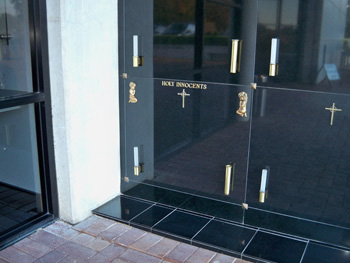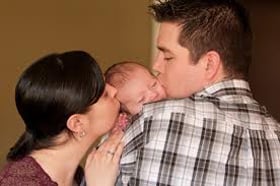Catholic Communications, Sydney Archdiocese,
1 Aug 2013
1 Aug 2013

The birth of a baby is joyous but tragically for some parents it is a time of grief
Approximately 1200 infants across Australia die before their first birthday, most in the first precious few days or weeks of life. Many others are still born. But for the majority of these babies and their distraught families there is a lack of palliative care or support.
This week Dr Dominic Wilkinson, Associate Professor of Neonatal Medicine and Bioethics at the University of Adelaide issued an urgent call for Australia to address the lack of palliative care available for babies who die in the womb or in the days or weeks following their birth.
"There is a need to acknowledge palliative care is important for foetuses and newborn infants with life-limiting illnesses, just as there is at any other age," he said in an article for the prestigious on-line academic journal, The Conversation since reprinted in many mainstream outlets.
Palliative care for babies and their families may not yet be widely available in Australia but once again, Catholic hospitals and Catholic perinatal health care centres are leading the way.
Just as the Sisters of Mercy and Sisters of Charity founded Australia's first hospices and helped establish the first specialist palliative care teams for the terminally ill, for the past several years the Mater Mothers' Private and Public Hospitals in Brisbane and Melbourne's Mercy Hospital for Women have provided in-house Specialist Perinatal Palliative Care. Calvary hospitals and health care centres in NSW, Tasmania, the ACT and South Australia also offer perinatal palliative care with specialist palliative care services available if or when required.
In addition, St John of God's Raphael Centres in NSW, Victoria and WA also offer support, counselling and pastoral care for families to deal with their loss or with the emotional turmoil of receiving a terminal or life-limiting diagnosis either during pregnancy or after the birth of their child.
But perhaps the most innovative support for families no matter where they live is the first of its kind Perinatal Palliative Care online website established by Catholic Health Australia.

Holy Innocents crypt for still born babies inside the doors of the Catholic Mausoleum of Resurrection at Rookwood Cemetery
Celebrating its first anniversary this month the website gives guidance, support, counselling and comfort, important resources as well as links to hospitals and palliative care services across the country. The website pnpc.org.au also provides a chance for families to share their grief and the roller coaster of emotions they are experiencing with families who have experienced the same bittersweet journey.
"Through this project we have been able to hear from parents who have made the decision to continue with a pregnancy knowing the baby may not live and share the joys and sorrows the experience has created for them," says Martin Laverty, CEO of Catholic Health Australia.
The website not only includes first-person video-stories from parents and families who have gone through the heartbreak of losing a child in the first year of life but offers advice and counselling via video from clinicians, obstetricians, fetal medical care specialists as well as some of Australia's leading perinatal palliative care specialists.
Developed by CHA in collaboration with Catholic Hospitals such as Mater Mothers in Brisbane, the Mercy Hospital for Women and Calvary Healthcare the site includes interviews with families who have turned to perinatal palliative care and how this helped them find comfort during their beloved infant's all-too-brief life.
Developed less than 40 years ago, palliative care is a relatively new medical specialty and grew out of the long tradition of hospice care of the dying.
As with hospices, palliative care provides the terminally ill with comfort and relief from pain and symptoms. In addition palliative care which also looks after those with complex life-limiting conditions, offers a multi-disciplined approach that addresses the spiritual, emotional and psychological needs of the very ill or those in the final stages of life, as well as giving support and help for families before and after their loss.
Just as Australia's leading Catholic hospitals both public and private have helped lead the way in perinatal palliative care, the Archdiocese of Sydney has led the way in not only acknowledging how devastating the loss of an unborn child can be, but in 2009 in conjunction with the Catholic Cemeteries Board set aside a special crypt at Rookwood Cemetery as a final resting place for stillborn infants.

Every moment with a baby is valuable even if such time is brief
Offering free interment and a permanent memorial for the cremated remains of stillborn babies, Holy Innocents as the consecrated area inside the glass doors of the Catholic Mausoleum of the Resurrection is known, the niches of the stillborn infants interred here are each engraved with the name of the baby and the date of their death.
By offering interment free, young couples are saved thousands of dollars but more importantly have a permanent memorial and acknowledgement of the preciousness and love they felt for their unborn baby.
"Most young parents who suffer the tragedy of a stillborn infant don't have their own burial plot or financial resources to buy one," the former CEO of the Catholic Cemeteries Board, Michael McMahon whose idea it was to establish the Holy Innocents crypt are seeing a similar scheme in operation in the US.
"Still births have always created a dilemma for parents and frequently the depth of grief felt after the death of a baby before or shortly after birth is not fully appreciated by friends or family and parents, in the midst of trying to come to terms with their loss, are faced with the added stress of trying to work out what to do with the remains," he explained of the Board's important new initiative in 2009.
For families needing help, comfort, pastoral care, resources and emotional support for their infants and for themselves, log on to Catholic Health Australia's peri-natal palliative care website at www.pnpc.org.au. To find out more about the Holy Innocents crypt for stillborn babies at Rookwood Cemetery contact the Catholic Cemeteries Board at http://www.catholiccemeteries.org.au/
SHARED FROM ARCHDIOCESE OF SYDNEY
Comments